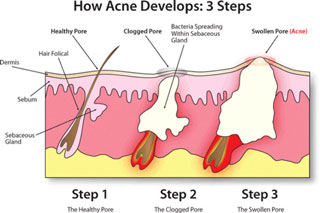 ‘Acne’ is the common term for the condition known by doctors as acne vulgaris. Acne appears as many other variants, but we will focus here on the one most frequently requiring treatment by a professional dermatologist.
‘Acne’ is the common term for the condition known by doctors as acne vulgaris. Acne appears as many other variants, but we will focus here on the one most frequently requiring treatment by a professional dermatologist.
Acne vulgaris presents with the following:
Inflammatory lesions:
- Nodules – large red lumps
- Papules – small red bumps
- Pustules – white or yellow pimples
Non-inflammatory lesions:
- Blackheads
- Whiteheads
- Cysts
Secondary lesions (considered the ‘after effects’ of acne):
- Scars
- Excoriations – spots that are scratched or picked
- Erythematous macules – red marks from healed spots
- Pigmented macules – discolored marks from healed spots
How Acne Works
Why does acne vulgaris happen in the first place? The onset and severity of acne may be inherited from your parents. Most patients will tend to develop their first symptoms at puberty. The condition is strongly related to hormones and their impact on skin.
The skin has three layers – the epidermis, the dermis and the subcutaneous fat. Within the dermis are glands that produce sebum. When there are high levels of hormones in the skin, it triggers these glands to enlarge and for more sebum to be produced. This increase in sebum may lead to clogging of the pore. This leads to comedone formation. The follicle may then rupture to form a ‘pimple’.
Treatment Plan
Acne vulgaris is graded as ‘mild’, ‘moderate’ or ‘severe’. A treatment plan is based on the progress and severity of the condition:
- Treatment for mild acne – this is usually a ‘topical’ approach that includes appropriate cleansers and washes and the use of oil free cosmetics. Some antibiotic products and/or a retinoid may be required.
- Treatment for moderate acne – is similar to the treatment for mild cases but also incorporates oral antibiotics.
- Treatment for severe acne – this is more urgent, as cystic acne may lead to permanent scarring. Therapy is based on oral medications including retinoids, antibiotics and sometimes corticosteroids. The same cleansing products as mild and moderate cases may be recommended.
If you have any questions or concerns about acne contact your local doctor, who will arrange for you to see a dermatologist. Contact us today.



